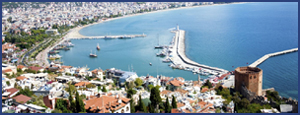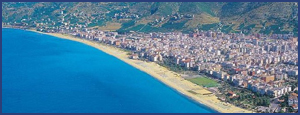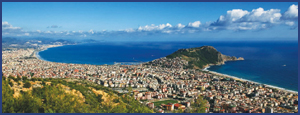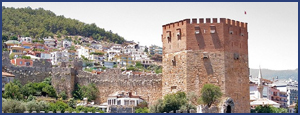Turkey
The oldest traces of habitation have been found in Turkey on the Mediterranean coast, in caves near Antalya were 100,000 years old tools found. Around 2000 BC. moved from Central Asia into Turkey a tribe called the Hittites. They managed to get a small part of Asia. In the 9th century BC. Oerartiërs took the power of the Hittites, and ruled over an area extending over the area of present Armenia, Iraq and Turkey.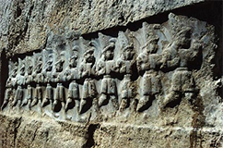 Around 1100 before Christus the kolonisation was coming from the mainland of Greece. The combination of Greek culture and influences
of the original inhabitants came the high Ionian culture. In the 6th century BC. conquered the Persians Oerartische rich, only the
Greek coastal cities retained their independence. After Alexander the Great in the 4th century BC. the whole "civilized" world conquered,
conquered the Romans in the 2nd century BC. large parts of Asia Minor.
Around 1100 before Christus the kolonisation was coming from the mainland of Greece. The combination of Greek culture and influences
of the original inhabitants came the high Ionian culture. In the 6th century BC. conquered the Persians Oerartische rich, only the
Greek coastal cities retained their independence. After Alexander the Great in the 4th century BC. the whole "civilized" world conquered,
conquered the Romans in the 2nd century BC. large parts of Asia Minor.
In the 2nd century AD. Emperor Constantine moved his capital from Rome to the Greek colony of Byzantium on the Bosporus. The city is known as Constantinople, the city of Constantine.
Although the western part of the Roman Empire was conquered by Germanic peoples was Constantinople, the center of the Byzantine Empire, which existed almost 1000 years.
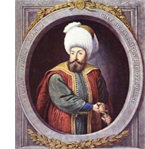
Around 1300, Osman I founded a dynasty, after victorious wars with Mongols and Hungarians among others, would become the mighty Ottoman Empire.
In 1571 the Turks lost the Battle of Lepanto against the Spaniards and the Venetians. This was the beginning of the downfall of the Ottoman Empire. The Ottoman Empire slowly crumbled until after the Crimean War Peace of Paris was signed. The Turks were still retain their independence but also had little power left. In the first World War the Turks chose the side of the Germans, but after initial successes the Ottoman Empire was finally overrun. The Allies divided after the war the Turkish territory. The major damage to Turkey's honor was the fact that the Greek Aegean coast and throughout much of the hinterland were assigned.
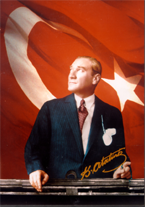 The man responsible for the initial success in the first World War also played a major role in the Turkish resistance against the Greeks, Mustafa Kemal Atatürkrk.
The man responsible for the initial success in the first World War also played a major role in the Turkish resistance against the Greeks, Mustafa Kemal Atatürkrk.
In 1922 the Turks drove the Greeks into the sea and literally came to a bloody end to the war of independence. After negotiations in 1923 were the limits of the current Republic of Turkey is largely fixed. The years between 1923 and 1938 were entirely devoted to Atatürkrk. He built a Western-state model. In 1928 Islam as state religion abolished, the "layiklik" was introduced, the absolute separation between mosque and state. The death of Atatürkrk on 10 November 1938 was a big shock for Turkey.
In the second World War did to Turkey a few weeks before the end of the war to remain neutral. Since the 50s, Turkey was constantly torn between democracy and dictatorship and several coups have occurred, accompanied by much political violence. In 1980, General Evren staged a coup. The peace was restored and terrorism bloody manner. Democracy was suspended. After adopting a new constitution in 1983 were again held elections, the Motherland Party won the majority of Ozal. This party devoted much attention to encouraging foreign investment. This also benefited the tourism since the mid 80s.
After the death of Ozal in 1993, Demirel was elected president and succeeded by Tansu Çiller, the first female Prime Minister. After the elections in 1995, Erbakan became the first Islamist prime minister since the founding of the Turkish republic. Under pressure from the army in 1997, Erbakan was forced to resign. Following this issue, the debate flared up again on the dominant role of the military in Turkish politics. Although Turkey since the 80s has developed into a modern Western-style state, there are still some problems. One is the Kurdish question. The Kurds can hardly express their own culture. In the east of the country actively steer the PKK, which seeks an independent Kurdish state. Since 1984 the PKK is trying to achieve with much violence. The Turkish government responds to the actions of the Kurds as a violent manner. In 1999, the Kurdish leader Ocalan, imprisoned and put to death. The human rights situation remains very encouraging. Still find a place of torture in police stations and prisons. This situation is also highly desired membership in the road.
